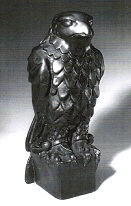
MacGuffin
In fiction, a MacGuffin (sometimes McGuffin) is an object, device, or event that is necessary to the plot and the motivation of the characters, but insignificant, unimportant, or irrelevant in itself.[1][2][3][4][5] The term was originated by Angus MacPhail for film,[2] adopted by Alfred Hitchcock,[1][2][3][4][5] and later extended to a similar device in other fiction.[4]
For the cipher, see MacGuffin (cipher). For the surname, see McGuffin.The MacGuffin technique is common in films, especially thrillers. Usually, the MacGuffin is revealed in the first act, and thereafter declines in importance. It can reappear at the climax of the story but may actually be forgotten by the end of the story. Multiple MacGuffins are sometimes derisively identified as plot coupons.[6][7]
Examples[edit]
Alfred Hitchcock popularized the use of the MacGuffin technique.[27] Examples from Hitchcock's films include plans for a silent plane engine in The 39 Steps (1935), radioactive uranium ore in Notorious (1946), and a clause from a secret peace treaty in Foreign Correspondent (1940).[28][29]
A more recent MacGuffin is the briefcase in Pulp Fiction (1994), which motivates several of the characters during many of the film's major plot points but whose contents are never revealed.[30]
George Lucas also used MacGuffins in the Star Wars saga. He "decided that the Force could be intensified through the possession of a mystical Kiber Crystal [sic]—Lucas's first, but by no means last, great MacGuffin."[31]
In the 1998 film Ronin, the plot revolves around a case, the contents of which remain unknown. At the end of the film, it is said to have led to a historic peace agreement and an end to the Troubles in Northern Ireland.[32]
A similar usage was employed in John Carpenter's Escape from New York, where the protagonist Snake Plissken is tasked with rescuing both the President of the United States and a cassette tape that will prevent a devastating war between the country and its enemies. While there are hints throughout the film, the contents of the tape are never revealed to the audience.[33]
Cultural references[edit]
In Mel Brooks's parody of Hitchcock films, High Anxiety (1977), Brooks's character's hotel room is moved from the 2nd to the 17th floor at the request of a Mr. MacGuffin, a recognition by name of Hitchcock's use of the device.[34]